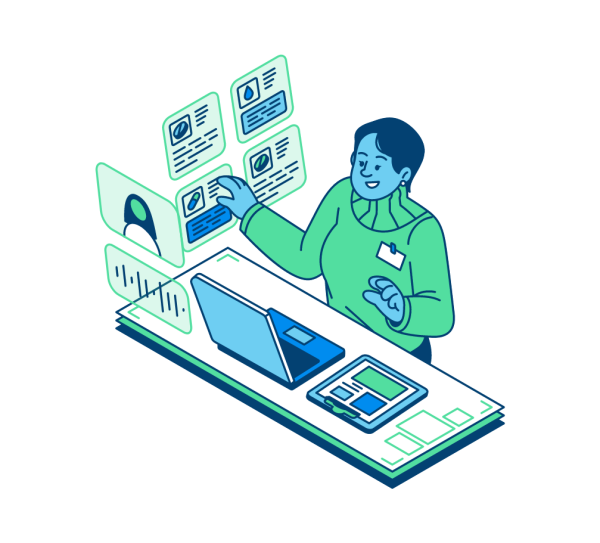 |
CrowdStrike's July outage shook the global business community and made clear the need to strengthen the infrastructure and platforms delivering our workloads. As businesses rethink their strategies, prioritizing reliable and secure Virtual Desktop Infrastructure (VDI) solutions is critical. VDI boasts many benefits for businesses that need to provision and manage systems across different locations. Virtual environments can be configured to a strict standard, providing all the necessary applications and security requirements. These baseline environments remain in the data center and are quickly provisioned to users as necessary. In roles where users frequently share systems, thin clients can be deployed, allowing users to log into any system to access their profile and desktop environment. When VDI is combined with thin client hardware, institutions enjoy the security, flexibility, and cost efficiency that come with thin clients and can offer employees a clean, clutter-free workspace with room for upgrades that boost productivity. Here are 6 ways VDI is transforming banking operations for the better: |
|
|
Securing the Banking and Financial SectorBecause VDI’s actual working environment remains in the data center, many common attack vectors are removed. Data remains stored in a secure data center and the workloads accessing the data are also housed on secure servers. The centralized nature of VDI also ensures that each user is working on an up-to-date system. When a new patch or security update becomes available, IT can apply these changes to the baseline image. All users running virtual desktop environments receive the updated image. There is no need to push updates and wait for systems throughout the entire IT infrastructure to receive the latest security settings. And there’s no risk that mobile devices outside the network might not receive critical updates in a timely fashion. Mobile devices connecting remotely, like clients within the corporate environment, are accessing the virtual environment hosted in the data center. VDI allows for ease of recovery from incidents beyond IT’s controls such as the recent CrowdStrike outage. A locked-down, stateless VDI machine will prevent viruses and ransomware from being accidentally unleashed in the environment, unlike traditional workstations and PCs that carry certain vulnerabilities—such as physical theft, direct access to system resources, and the potential for malware to be installed. In a VDI architecture, the client system is essentially a remote control. Changes to the client system will not reach critical processes. Application workloads and sensitive data are abstracted from the client layer and remain securely removed, protected by firewalls and other security protocols in the data center. To further protect data from misuse, virtualized environments can be segmented into various "trust zones". A large bank, for instance, can organize applications and data into zones so information relevant to one division is not exposed to other divisions. By limiting a group's access to only the resources it requires, an organization can further reduce the potential for breaches and misuse of data. |
|
|
Facilitating Business Continuity and Disaster RecoveryMaintaining uninterrupted banking services is crucial for customer trust and business continuity. VDI supports disaster recovery strategies by enabling rapid restoration of desktop environments and applications in the event of hardware failures, natural disasters, or cyber incidents. Banks can replicate virtual desktops across geographically dispersed data centers, ensuring seamless service delivery and minimizing financial losses during disruptions. |
|
|
Enhancing Customer ExperienceCustomer experience is a cornerstone of success in banking. VDI facilitates personalized banking services by enabling frontline staff to access customer information and transaction histories in real time, regardless of their physical location. This capability enhances responsiveness to customer inquiries, accelerates account opening processes, and supports cross-selling of financial products and services. Improved efficiency in customer interactions leads to higher satisfaction levels and strengthens customer loyalty. |
|
|
Supporting Remote WorkforceThe shift towards remote work in the banking industry requires secure and efficient remote access to banking systems and data. VDI enables banking employees, including relationship managers, loan officers, and back-office staff, to securely access their desktop environments and essential applications from home or branch offices. This flexibility enhances employee productivity and ensures the continuity of banking operations during unexpected disruptions or emergencies. |
|
|
Strengthening Compliance and AuditingCurrent regulations, such as the Sarbanes-Oxley Act and the General Data Protection Regulation, define strict rules around data protection and compliance auditing. When an organization relies on traditional workstations it can be difficult for the IT department to monitor exactly how local applications and sensitive data are used. With VDI systems, IT gains complete insight into user activity. Individual transactions can be monitored, and IT can track exactly what data is accessed by which users. Full data protection is maintained with data remaining in the data center on secure, encrypted drives. There is no risk of a rogue user copying data to a USB drive or sensitive data being exposed on a lost or stolen device. |
|
|
Enabling Efficient IT ManagementManaging IT infrastructure in a banking environment with numerous branches and diverse operational needs can be complex. VDI simplifies IT management by allowing centralized deployment, configuration, and maintenance of desktop environments and applications. IT teams can efficiently provision new desktops, perform updates and patches, and troubleshoot issues remotely, minimizing downtime and optimizing resource allocation. |
Staying ahead in the competitive banking industry requires adapting to change and innovating proactively to enhance efficiency, security, and customer satisfaction. VDI is the perfect solution for most modern business environments. However, it is particularly well-suited to highly regulated industries, such as banking and financial businesses, where data protection and strict auditing policies are mandated. Combined with streamlined deployment and centralized systems management capabilities, VDI is a strategy financial institutions can bank on.
Learn more about VDI and other relevant topics
at ERP Tech Summit 2024 coming up September 17-19!




